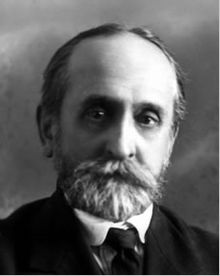Sergei Fjodorowitsch Oldenburg
Sergey Oldenburg ( Russian Сергей Фёдорович Ольденбург ; born September 14 . Jul / 26. September 1863 greg. In Bjankino close Nertschinsk ; † 28. February 1934 in Leningrad ) was a Russian Orientalist specializing in Buddhism . He was one of the founders of Russian Indology , he was a student of Ivan Minajew and teacher of Fyodor Shcherbatskoi .
Oldenburg came from the noble family of Oldenburg . His grandfather Friedrich Gustav von Oldenburg (* 1791) was a lieutenant general in the tsar's army and commander of Brest-Litowsk . His parents were the Russian major general Friedrich Otto von Oldenburg (* 1827) and Nadeshda von Berg adH Kandel (* 1833; † 1909).
Oldenburg was Professor of Oriental Studies and Indology at the University of Saint Petersburg . He was elected to the Russian Academy of Sciences in 1900 and served as its permanent secretary from 1904 to 1929.
He undertook two trips to Central Asia in 1909/10 and 1914–1915 . There he discovered a number of previously unpublished Sanskrit texts . He initiated several scientific expeditions to Tibet and Djungaria , which unearthed other unique Buddhist texts. Oldenburg had already published a collection of Buddhist texts in 1897. This Bibliotheca buddhica continues to this day. In 1917 he founded a commission of the Academy of Sciences, which examined the nationality question in the Russian multinational empire.
From 1912 to 1917 Oldenburg was a member of the State Council of the Russian Empire and after the February Revolution took over the post of Minister of Education in the provisional government. After the October Revolution , he decided, unlike many of his party friends of the Constitutional Democrats , to spend the rest of his life in Russia. This was due to his long-term acquaintance with Lenin . He had met Lenin's brother Alexander Ulyanov as a student . After his execution after the failed assassination attempt on Alexander III. Oldenburg and Lenin met for the first time in Saint Petersburg .
Although Oldenburg was briefly detained by the Cheka in 1919 , he was allowed to head the Russian Academy of Sciences until 1929. Oldenburg dedicated the rest of his life to the Soviet Institute for Oriental Studies, whose predecessor, the Asian Museum, he himself initiated. In 1926 he was elected a corresponding member of the Göttingen Academy of Sciences . In 1927 he was accepted as a corresponding member of the Prussian Academy of Sciences .
literature
- Entry in: Who is it? , III. Edition (1908), p. 984.
- Genealogical Handbook of the Baltic Knighthoods (New Series) , Hamburg 2011, Vol. 1, pp. 302–303.
Individual evidence
- ↑ Holger Krahnke: The members of the Academy of Sciences in Göttingen 1751-2001 (= Treatises of the Academy of Sciences in Göttingen, Philological-Historical Class. Volume 3, Vol. 246 = Treatises of the Academy of Sciences in Göttingen, Mathematical-Physical Class. Episode 3, vol. 50). Vandenhoeck & Ruprecht, Göttingen 2001, ISBN 3-525-82516-1 , p. 182.
- ^ Members of the previous academies. Sergej Fedorowitsch von Oldenburg. Berlin-Brandenburg Academy of Sciences and Humanities , accessed on May 17, 2015 .
Web links
- Literature by and about Sergei Fjodorowitsch Oldenburg in the catalog of the German National Library
| personal data | |
|---|---|
| SURNAME | Oldenburg, Sergei Fjodorowitsch |
| ALTERNATIVE NAMES | Oldenburg, Sergej Fedorowitsch von |
| BRIEF DESCRIPTION | Russian orientalist |
| DATE OF BIRTH | September 26, 1863 |
| PLACE OF BIRTH | Bjankino near Nerchinsk |
| DATE OF DEATH | February 28, 1934 |
| Place of death | Leningrad |
